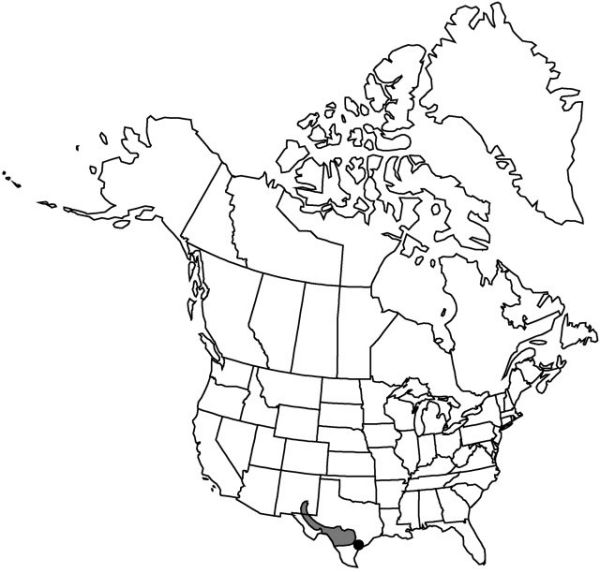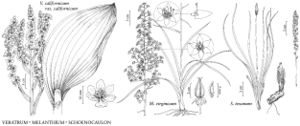Schoenocaulon texanum
Linnaea 25: 262. 1852.
Bulbs ellipsoid to plumply ovoid, 2–4.5 × 1.2–4 cm diam., usually arranged either in a circle or semicircle around a common rhizome, or one above the other on a vertical rhizome. Leaves 5–8, 15–60 cm × 2–6 mm, shorter than raceme to just surpassing it, rarely longer. Scape 13.5–55 cm. Racemes condensed, 30–250-flowered, 4–32 cm, flowers closely packed along axis. Flowers: tepals linear to cuneate proximally and broadly subulate distally, 2.3–3.8 mm, fleshy, margins entire or rarely irregularly crenate; auricles distinct or absent; filaments subulate, 2 times tepal length. Capsules 1–3-locular, ellipsoid to plumply ovoid, 0.8–1.9 cm × 5–12 mm. Seeds 2–4(–8) per locule, 3–6.7 × 1.6–2.2 mm. 2n = 16.
Phenology: Flowering spring–early summer, sometimes later following unseasonable rainfall.
Habitat: Occasional in dry, rocky, limestone soils in chaparrals, usually growing under scrubby vegetation
Elevation: 0–2200 m
Distribution

N.Mex., Tex., Mexico (Chihuahua, Coahuila, Durango, San Luis Potosí).
Discussion
The morphology of Schoenocaulon texanum is peculiarly dependent upon annual rainfall. Plants of small stature but average bulb size can be readily distinguished as the products of one or several seasons of lower than normal rainfall. The hallmarks of such plants are congested racemes, few flowers, these often appearing withered and brown, and ovaries that do not mature or have perhaps only one small locule ripening to produce a few seeds.
Selected References
None.
